Now we arrive at the weakest link in the otherwise brilliant run of Twin Peaks: Days 20-26. That's not to say these episodes do not contain many brilliant moments, too, but the pulse-pounding momentum of the show screeches to a halt here. We jump off the rails for a brief span to explore some fun tangents and some not-so-fun tangents. This is the third article of a five-part series to re-title and summarize the Twin Peaks series and prequel movie for the benefit of the imminent Blu-Ray release.
For first-time viewers of Twin Peaks, this is the stage where most will probably wonder if the show will just digress from this point into random and silly side stories. Throughout these episodes, we catch glimpses of the original central dramatic arc of the Laura Palmer story line, but a lot of the narrative drive from earlier is simply missing by now. Many a Peaks fan has had their patience pushed to the limit with this particular batch of episodes, causing some viewers to jump ship early and miss out on the show's excellent upswing later in the season.
In these uneven episodes, the usually intricate world of Twin Peaks seems to break apart and drift into distinct and separate continents, with the characters becoming strangely disconnected from each other's story lines. Twin Peaks here feels less like the small town united in grief over Laura's tragic death, and more like a competing group of rival factions vying for screen time within the same show.
To a degree, the characters seem to have split off from the main show to form new spinoffs, which are all intercut with one another. When these discreet factions do find sporadic reasons to interact with each other, it tends to feel a little more forced and contrived than before. And unfortunately, the formerly seamless blending of comedy, drama, and horror also dissipates for a while, leaving the audience to feel jarred by the show's shifts in tone more than usual.
Without the Laura Palmer murder investigation to bind everyone and everything into an intricate web, the show's story feels strangely off kilter throughout these particular episodes. In one thread, we explore the ominous hints at possible supernatural or extra-terrestrial (intra-terrestrial?) involvement hinted at earlier in the show. But then we shift sporadically to some of the more soap opera'ish plot lines, too, including Nadine's psychotherapeutic escapades as she tries out for high school cheerleading. Each story has merit on its own terms, but when blended together sans Laura Palmer's murder investigation, everything starts to feel more random than usual.
For instance, in another story thread, we witness the show's writers try to write themselves out of a corner. Arguably the show's most central character, Agent Cooper, no longer has a justification for staying in the town of Twin Peaks. He successfully concluded one of the most brutal, demanding, and bizarre serial killer investigations in history. But not only is Agent Cooper's achievement ignored by the news media, but he is also immediately suspended from active service by the Bureau on trumped up corruption charges.
Which in and of itself, could have been a very interesting and plausible path to take if it were not mixed and matched with several other wild tangents that ultimately test the audience's suspension of disbelief a little too much. For instance, nearly everyone in town seems to gloss over the brutal truths uncovered regarding the identity of the homecoming queen's murderer.
Even Laura's best friend, Donna, seems completely oblivious to the horrifying ramifications of it, and literally spends zero screen time to process the horrific facts of Laura's sad life once they were revealed. And Ben Horne's uncharacteristically silly mental breakdown, which causes him to live out the delusion of being a Confederate General near the end of the Civil War, might have made more sense if the writers had directly tied it to Ben's grief over the horrific facts of Laura's life and death. But as presented, it is just a random subplot without much bearing on the rest of the show.
When transitioning from the main Laura Palmer story arc, these random story developments tend to grate on the audience's nerves more than they would usually. But unfortunately, there is a certain indelicacy in the way the show advances at this stage that requires the audience to lean more on their soap opera'ish sea legs than ever before. Since the audience has a harder and harder time swallowing each leap in logic, one after the other, the show goes off its axis for a while. It is worth mentioning that in hindsight, even the silliest of these subplots can grow on you over time. But as first-time viewers, we must simply stare into the dark void of madness and try in vain to not go mad ourselves....
So for a span of time, it looks like Twin Peaks will be exclusively reserved for the whacky misadventures of the cast, as they travel down a parade of mini-story arcs and temporary guest characters. From a young ingenue bewitching the aged mayor, to biker bad boy James Hurley going off on a strangely non-Peaksian film noir odyssey into a completely different town, to a thirty-something Nadine attending High School for psychotherapeutic reasons, etc. The show is undeniably fragmented here and would eventually require the strong hands of the show's creators to piece it all back together again.
Ironically, following a character on his adventures out of town would have been interesting in the case of Agent Cooper's intra-bureau troubles. It would have been the perfect opportunity to take Cooper out of Twin Peaks for an episode or two to follow him as he reports back to FBI headquarters in Philadelphia to debrief his superiors about the Laura Palmer case and testify at his disciplinary hearing. We would see how other agents in the bureau view Cooper, and how he navigates through that world. Instead of that interesting tangent, of all the characters we could follow away from the show's usual setting, it is biker bad boy James Hurley. What? Why?
Then there is the infamous Little Nicky story line on what has been lovingly referred to on the Late Show with David Letterman as the "Lucy, Andy, and Dick Show!" Although these lovable characters are hilarious and are given some interesting bits of comedy to perform here and there, their story line tends to eschew almost everything else happening in town. To say the least, these varying plot lines are a little bit of a jumble when compared to the previous stretch of episodes.
And again, we cannot really emphasize this enough, but it is bizarre for these episodes to gloss over the horrifying aftermath of Laura's murder investigation. It seems out of character for the town that practically shut itself down at the news of her murder would now proceed with business as usual after the disturbing facts about her lifetime of abuse comes to light.
If the same town from the pilot episode heard the news of what was revealed in episode 16, then we have a hard time imagining any scenario that does not involve that town being shattered to pieces for weeks. There is a missing link in this show where these characters should have dealt with the ramifications of Laura's lifetime of abuse that occurred right under their noses. Everyone should be taking time to come to terms with it. Instead, it is like everyone took amnesia pills to forget about such unpleasantness and they all decided to move on with their lives as normal.
This strange evasion about Laura is probably why the writers of the series break free from the show's normally continuous narrative structure for the first and only time in the show's run. They skip Days 18 and 19 of the narrative entirely, taking us directly to Day 20. This is the only time jump in the TV series, and it seems to have been done in the hopes of mitigating the jarring tonal shift between this new era of Twin Peaks and the episodes that immediately preceded it.
In these uneven episodes, the usually intricate world of Twin Peaks seems to break apart and drift into distinct and separate continents, with the characters becoming strangely disconnected from each other's story lines. Twin Peaks here feels less like the small town united in grief over Laura's tragic death, and more like a competing group of rival factions vying for screen time within the same show.
To a degree, the characters seem to have split off from the main show to form new spinoffs, which are all intercut with one another. When these discreet factions do find sporadic reasons to interact with each other, it tends to feel a little more forced and contrived than before. And unfortunately, the formerly seamless blending of comedy, drama, and horror also dissipates for a while, leaving the audience to feel jarred by the show's shifts in tone more than usual.
Without the Laura Palmer murder investigation to bind everyone and everything into an intricate web, the show's story feels strangely off kilter throughout these particular episodes. In one thread, we explore the ominous hints at possible supernatural or extra-terrestrial (intra-terrestrial?) involvement hinted at earlier in the show. But then we shift sporadically to some of the more soap opera'ish plot lines, too, including Nadine's psychotherapeutic escapades as she tries out for high school cheerleading. Each story has merit on its own terms, but when blended together sans Laura Palmer's murder investigation, everything starts to feel more random than usual.
 |
| Mounties. Why'd it have to be Mounties? |
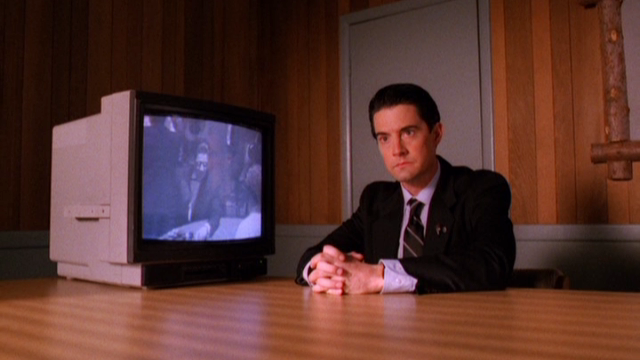 |
| "Wait, so the Bureau and Canadians frown on Agents running unauthorized operations across the border?! Well, consider me embarrassed...." |
 |
| "This is really the first time we had to talk about the horrifying truth of Laura's killer. Yeah, I didn't really want to talk about that either...." |
When transitioning from the main Laura Palmer story arc, these random story developments tend to grate on the audience's nerves more than they would usually. But unfortunately, there is a certain indelicacy in the way the show advances at this stage that requires the audience to lean more on their soap opera'ish sea legs than ever before. Since the audience has a harder and harder time swallowing each leap in logic, one after the other, the show goes off its axis for a while. It is worth mentioning that in hindsight, even the silliest of these subplots can grow on you over time. But as first-time viewers, we must simply stare into the dark void of madness and try in vain to not go mad ourselves....
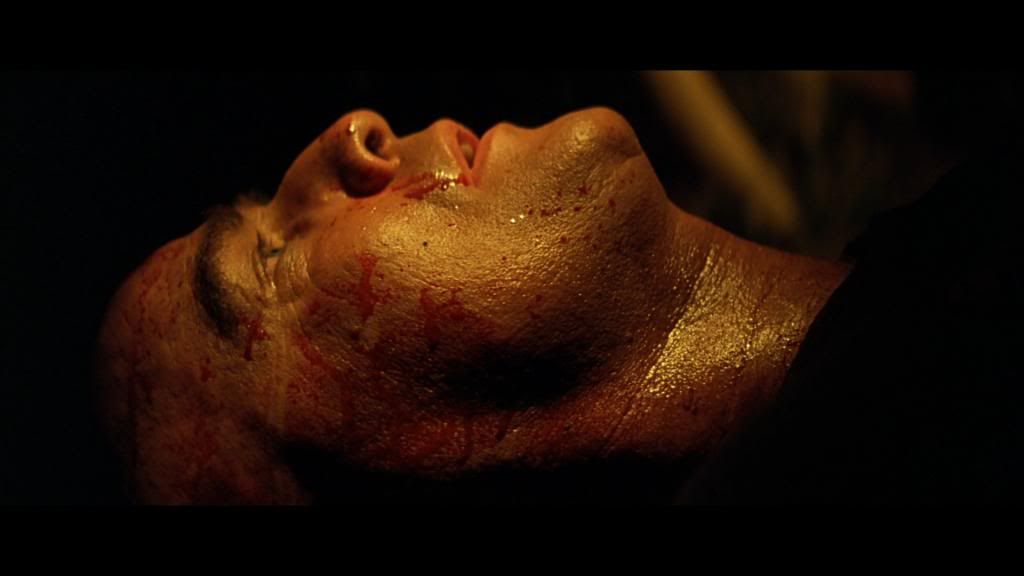 |
| Some say Col. Kurtz was never quite the same again after watching that Ben Horne Civil War subplot... |
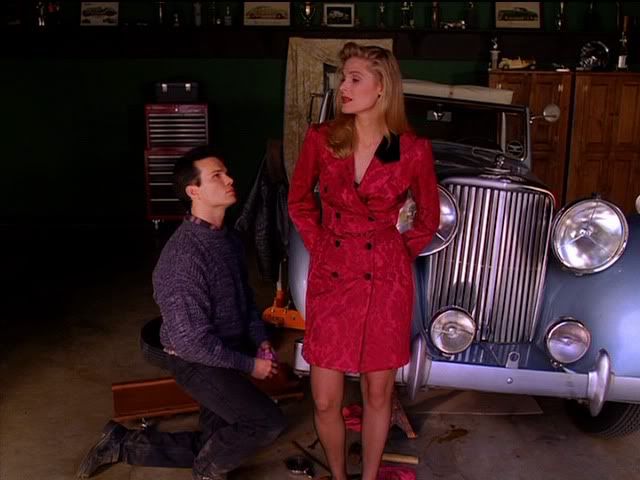 |
| Instead of Following Cooper on a Non-Twin Peaks-centric FBI Story Line that Would Have Made Sense, We Follow James |
Then there is the infamous Little Nicky story line on what has been lovingly referred to on the Late Show with David Letterman as the "Lucy, Andy, and Dick Show!" Although these lovable characters are hilarious and are given some interesting bits of comedy to perform here and there, their story line tends to eschew almost everything else happening in town. To say the least, these varying plot lines are a little bit of a jumble when compared to the previous stretch of episodes.
And again, we cannot really emphasize this enough, but it is bizarre for these episodes to gloss over the horrifying aftermath of Laura's murder investigation. It seems out of character for the town that practically shut itself down at the news of her murder would now proceed with business as usual after the disturbing facts about her lifetime of abuse comes to light.
 |
| Pete: "The Mayor and his brother Dougie have been feuding for years. It started because of a disagreement they had over a woman." |
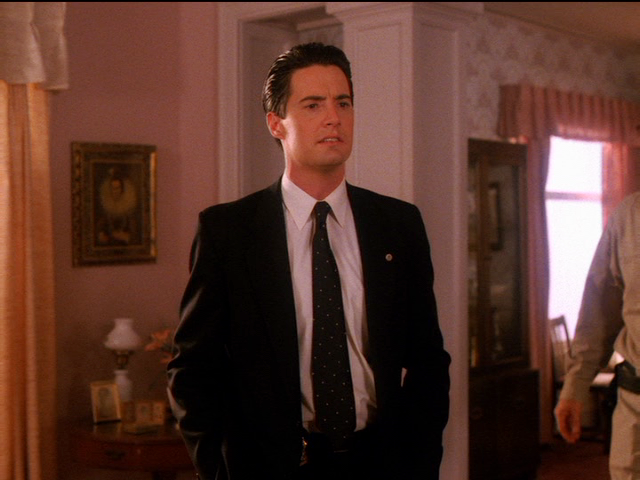 |
| Cooper: "Pete, you realize you're standing in the spot where BOB telepathically assaulted Maddy Ferguson shortly before beating and raping her to death, don't you?" |
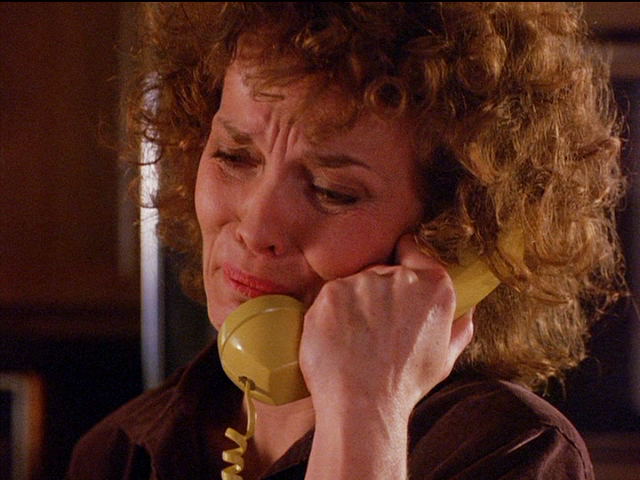 |
| Sarah Palmer's Reaction to Hearing a Hint of Possibly Something Bad Having Happened to Her Daughter (Pilot Episode) |
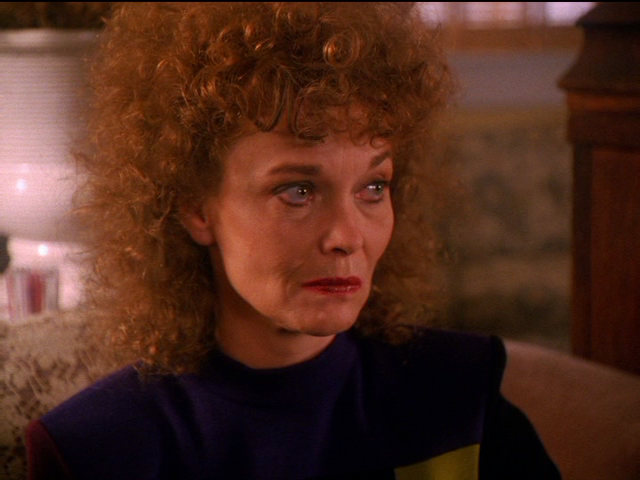 |
| Sarah Palmer Processing that a Demonic Creature Repeatedly Drugged Her Over the Years to Cover Up His Continual Rape and Torture of Her Daughter (Episode 17) |
However, simply jumping over the time period in which the characters would have come to terms with the nature of these murders, and how it has rocked their world, flies in the face of everything the show did earlier. Skipping over this important time of reflection, even if the aftershocks of the investigation would be exceptionally morose, is discordant with the tone of the rest of the series before it. Particularly the heartfelt pilot. The audience needs catharsis to heal from the event, too, but in some ways we are denied that healing when the characters are denied it.
The same Bobby who essentially broke down and openly wept at the Roadhouse when feeling the psychic reverberations of Laura's and Maddy's murders, now seems completely unphased a few days after discovering his high school girlfriend, his first lover, and a close personal friend since his childhood, was secretly living through a horrifying lifetime of abuse without him ever noticing. Bobby literally spends zero screen time to deal with these horrors. Instead, he simply puts on a new suit and develops more get-rich-quick schemes.
The same Donna who played, studied, and slept over with Laura throughout her life until now, seems more concerned over James's out-of-town motorcycle trip than she is with processing her BFF was the victim of many years of rape and other forms of psychic, physical, and psychological torture. Donna would surely be feeling many complex layers of guilt over her blindness about her friend's plight. But we certainly have no reason to believe it from everything we see of her three days later.
Everyone seems uncharacteristically blase about the horrific implications of Laura's adolescent life of abuse culminating in her murder. Somehow, I doubt so many of Laura's long-time associates, friends, and mentors would find many reasons to smile at the wake of her killer, let alone be so cheery and gregarious as their quirky lives move forward. In some ways, there is a surprising lack of continuity between the Twin Peaks of the past and this new bizarro Twin Peaks, where nobody seems to behave in a way quite consistent with their characters as established earlier.
So while the dip in the show's quality in these particular seven episodes is frustrating, yes, we would like to point out that these episodes would not have come across quite so badly if they had not directly followed one of the most brilliant run of excellent episodes in TV history. Had these seven episodes appeared in any other TV show, they would actually stand out as highly entertaining. We admit that these episodes provide some pretty solid dark comedy.
Many Twin Peaks fans have a bit of a gag reflex when they reach these episodes, and some have been known to skip over them (or large portions of them) during a series re-watch. And even though these particular episodes pale in comparison to the brilliance of what came before, we suggest that with some perspective on our side, much of these episodes are fantastic entertainment when viewed in their own right.
After all, there are some notable and intriguing concepts throughout these episodes, even if their presentation is admittedly flawed. For instance, the DEA Agent "Denise" Bryson played by future X-Files (1993-2002) star David Duchovny is one of the funniest characters introduced on the show. And the way Agent Bryson's investigation dovetails back to Jean Renault (played by the glorious Michael Parks) is clever and fun.
But unfortunately, these excellent moments in the story are occasionally refreshing detours from the otherwise clunky narrative. And although many important story elements from earlier in the series are brought to fruition here, for some reason, their payoff feels a little lackluster. Without the compelling Laura Palmer conundrum to explore while pursuing these story threads, we just have difficulty investing as much interest in them post-Laura Palmer.
Even the Windom Earle story line, which grows into the show's central plot in final episodes of the series, at this point, feels more like a nuisance for our characters to stay busy dealing with. Earle's agenda at this stage feels oddly unimportant and leaves first-time viewers without a very strong hook to carry them through this batch of episodes.
Part of the problem, again, is the mini-arc format of the show during this phase. For instance, instead of exploring Cooper's intriguing problems within the bureau, Coop's problems with his superiors seemed resolved a little too neatly and quickly. And Cooper's stint as a Sheriff's Deputy in Twin Peaks ultimately comes across as a little gimmicky, when it was actually a very touching development as the townspeople of Twin Peaks throw their full support behind him.
The show is undeniably stuck in a rut here. And when something interesting is introduced, it tends to be rushed through so quickly that it might feel like it never really happened. Many events in these episodes feel strangely disconnected from the rest of the show. Many key characters and story lines from the Laura Palmer days were either totally abandoned by this point, or concluded in unsatisfying ways.
The worst offender in this area has to be the unceremonious termination of the sweet and romantic relationship budding between Audrey and Cooper since Episode 01. Agent Cooper's strangely cold and officious rejection of Audrey in Episode 17 is not only unsatisfactory but also uncharacteristically cold after he had developed such a strong bond to her earlier. Honestly, this is likely the worst problem storywise with the series as a whole, as it deflates the most interesting and entertaining story thread remaining from the earlier episodes. And as much as the show tries to recover from this misstep, it never can. Not fully.
So as much as the audience can eventually learn to enjoy these episodes for what they are, the first-time viewers will need to develop a degree of patience they previously never needed before with this show. Veteran viewers all understand your pain. But those callouses need to be developed while the show temporarily devolves into a carnival freak show, of sorts. At this point, the show tends to ratchet up the weirdness for its own sake, at the expense of what preceded it.
In the past, Twin Peaks' patented quirkiness was always balanced with a grounded murder mystery, a fascinating character drama, and intriguing touches of supernatural horror. But in these episodes, the show's normally nuanced tone is skewed much more toward silliness. This leaves a bad aftertaste in our mouths reminiscent of the coffee Cooper and and Truman drank in Episode 02. And unfortunately, the fish that's polluting the Twin Peaks percolator takes quite some time before being removed.
This lapse in quality seems due in part to the temporary lack of attention of the show's co-creators, Mark Frost and David Lynch. The two filmmakers were focused more on their other projects at the time, including their new TV series: On the Air (1992). And without David Lynch's periodic returns to direct new episodes during this critical transitional period of the show, Twin Peaks loses some of its patented magic. And unfortunately for the show's ratings, this dip in the show's quality was concurrent with the Persian Gulf War breaking out, frequently preempting the normal airtime of the show, making the audience all the more vulnerable to defection. These factors, in large measure, contributed to the show's eventual cancellation.
But soon the co-creators would return their focus back to Twin Peaks, helping the show end on an amazingly strong note that leaves us wanting more. So if you bear with the show's weaknesses through this slump, then you will discover a dramatic return to form in the final episodes, which we will address in our next article. So as much as the show is lost in the woods for a time, Twin Peaks does find its way back in the end.
Note: Any purchase made via our web store or product links scattered throughout the article will contribute a small portion to the running of this site. Thank you for your support.
 |
| Bobby Sensing an Echo of Laura's Death in Episode 14 |
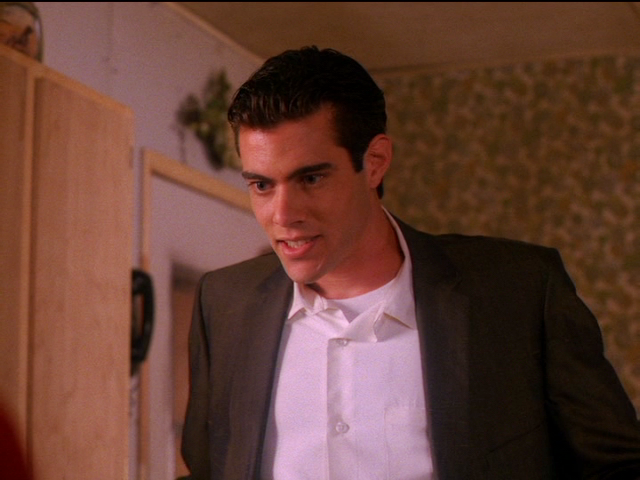 |
| Bobby a Couple of Days After Discovering His High School Sweetheart was Brutally Raped and Tortured for Years Under his Nose without His Knowledge |
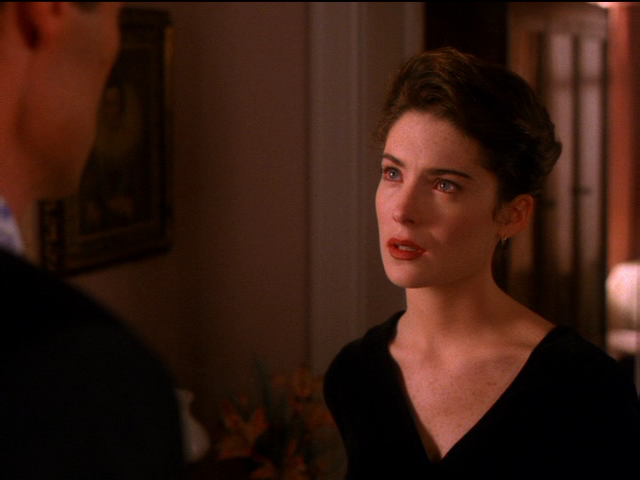 |
| Donna Pining Away for James at the Wake of her best friend's killer, after discovering her best friend hid from her a lifetime of abuse and pain. |
 |
| Major Briggs: "Congratulations Dr. Jacoby on completely failing your coked-up patient, who was brutally murdered by someone secretly abusing her for years." |
So while the dip in the show's quality in these particular seven episodes is frustrating, yes, we would like to point out that these episodes would not have come across quite so badly if they had not directly followed one of the most brilliant run of excellent episodes in TV history. Had these seven episodes appeared in any other TV show, they would actually stand out as highly entertaining. We admit that these episodes provide some pretty solid dark comedy.
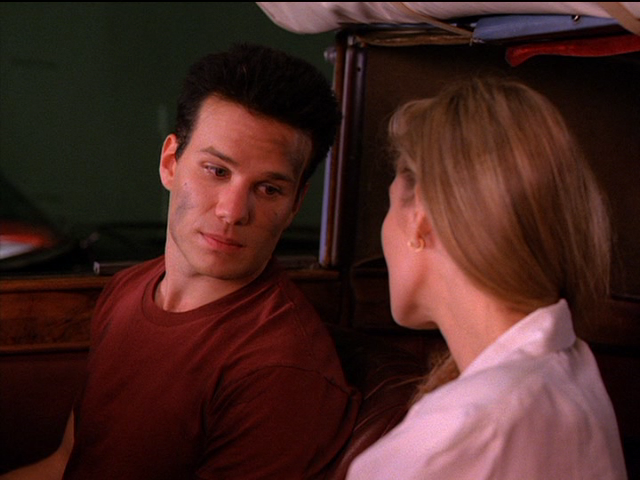 |
| Except for this Subplot with James and the Femme Fatale. Again we ask, why? |
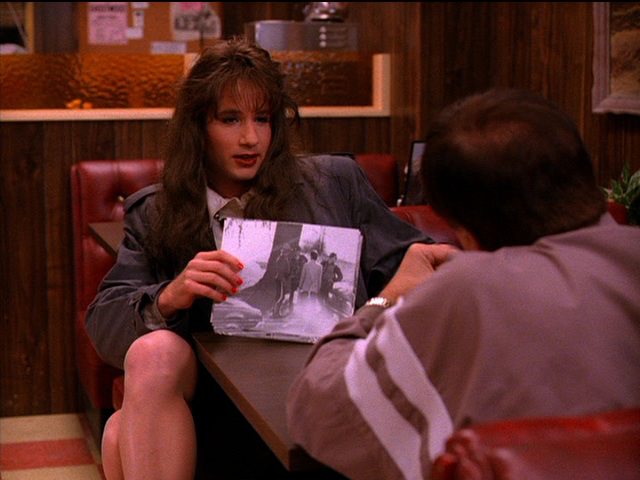 |
| Especially David "Drag'chovny" |
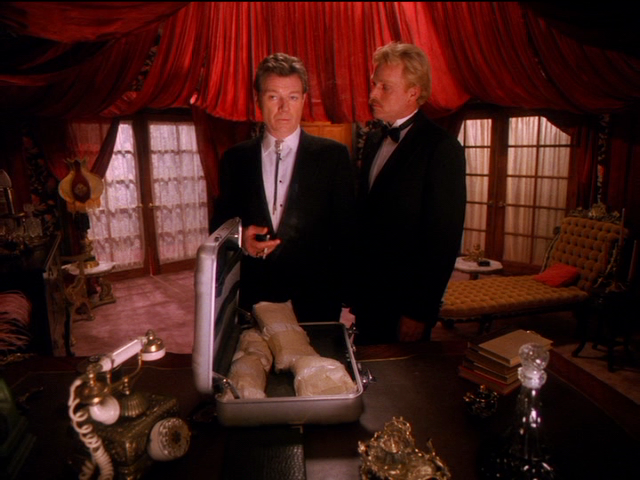 |
| "Beam me up, Tarantino." |
Even the Windom Earle story line, which grows into the show's central plot in final episodes of the series, at this point, feels more like a nuisance for our characters to stay busy dealing with. Earle's agenda at this stage feels oddly unimportant and leaves first-time viewers without a very strong hook to carry them through this batch of episodes.
Part of the problem, again, is the mini-arc format of the show during this phase. For instance, instead of exploring Cooper's intriguing problems within the bureau, Coop's problems with his superiors seemed resolved a little too neatly and quickly. And Cooper's stint as a Sheriff's Deputy in Twin Peaks ultimately comes across as a little gimmicky, when it was actually a very touching development as the townspeople of Twin Peaks throw their full support behind him.
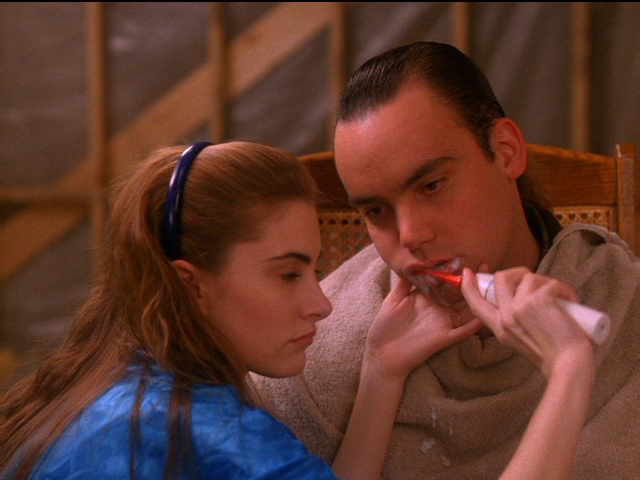 |
| No Caption Needed |
 |
| Pictured: Pure Pulchritude |
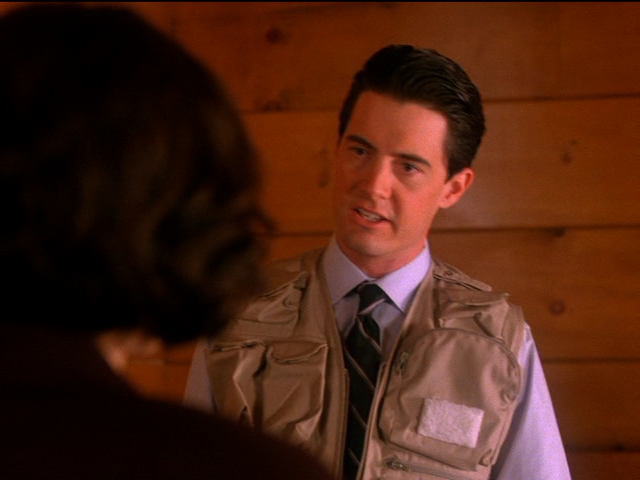 |
| Cooper: "I'm sorry Audrey, but my real-life GF Lara Flynn Boyle is jealous of you and won't let my character fall in love with you anymore on the show." |
 |
| Cooper (Cont.): "You're just—excuse me—too damn hot." |
 |
| Cooper: "I'm afraid your character has a far more interesting arc than hers and Rolling Stone gave you the coveted central position on the cover." |
 |
| Cooper (Cont.): "And my undeniable onscreen chemistry with you is making things awkward between us back home. You understand, right?" |
In the past, Twin Peaks' patented quirkiness was always balanced with a grounded murder mystery, a fascinating character drama, and intriguing touches of supernatural horror. But in these episodes, the show's normally nuanced tone is skewed much more toward silliness. This leaves a bad aftertaste in our mouths reminiscent of the coffee Cooper and and Truman drank in Episode 02. And unfortunately, the fish that's polluting the Twin Peaks percolator takes quite some time before being removed.
This lapse in quality seems due in part to the temporary lack of attention of the show's co-creators, Mark Frost and David Lynch. The two filmmakers were focused more on their other projects at the time, including their new TV series: On the Air (1992). And without David Lynch's periodic returns to direct new episodes during this critical transitional period of the show, Twin Peaks loses some of its patented magic. And unfortunately for the show's ratings, this dip in the show's quality was concurrent with the Persian Gulf War breaking out, frequently preempting the normal airtime of the show, making the audience all the more vulnerable to defection. These factors, in large measure, contributed to the show's eventual cancellation.
But soon the co-creators would return their focus back to Twin Peaks, helping the show end on an amazingly strong note that leaves us wanting more. So if you bear with the show's weaknesses through this slump, then you will discover a dramatic return to form in the final episodes, which we will address in our next article. So as much as the show is lost in the woods for a time, Twin Peaks does find its way back in the end.
DAY 20: MARCH 15, 1989
#17 IN THE KILLER'S WAKE a.k.a. "Dispute Between Brothers" Synopsis: The town gathers at a wake for Laura's killer. Agent Cooper is confronted by Agent Hardy (Clarence Williams III) and Mountie King (Gavan O'Herlihy) for a professional breach of conduct when surreptitiously operating in Canada in recent weeks. Agent Cooper and Audrey discuss the new parameters of their relationship. Nadine is enrolled back in High School. Dick Tremayne (Ian Buchanan) comes back out of the woodwork in an attempt to reclaim his potential role as Lucy's future husband and father of her child.
Agent Cooper is suspended from the FBI and must mount up his defense by tomorrow. Alleged drug dealing is also suspiciously added to the charges against Coop. Jean Renault returns to One-Eyed Jacks to take over the Horne's drug empire and enlists Norma's new father-in-law as his money launderer. Catherine Martell and Josie Packard unexpectedly pop back for a visit with Sheriff Truman. Cooper takes a break to go night fishing with Major Briggs, who casually introduces the concept of the White Lodge just before the Major goes missing in a strange blaze of light.
Agent Cooper is suspended from the FBI and must mount up his defense by tomorrow. Alleged drug dealing is also suspiciously added to the charges against Coop. Jean Renault returns to One-Eyed Jacks to take over the Horne's drug empire and enlists Norma's new father-in-law as his money launderer. Catherine Martell and Josie Packard unexpectedly pop back for a visit with Sheriff Truman. Cooper takes a break to go night fishing with Major Briggs, who casually introduces the concept of the White Lodge just before the Major goes missing in a strange blaze of light.
DAY 21: MARCH 16, 1989
#18 BLACK AND WHITE AND RED ALL OVER a.k.a. "Masked Ball" Synopsis: Major Briggs's troubling disappearance is dismissed by his wife Betty (Charlotte Stewart) as "work related." Agent Cooper stands up for his actions relating to his operations across the border at One-Eyed Jacks, and his suspension from the FBI is extended indefinitely. Cooper perks up when he discovers a former friend and colleague DEA Agent Dennis Bryson is assigned to investigate his drug charges. Although sympathetic to Cooper, Agent Bryson has undergone some drastic changes since they last met that could shake things up.
Windom Earle sends an ominous threat with a note containing a chess move to his former partner, Agent Cooper, hinting at a deadly match ahead. Dick Tremayne becomes the "Big Brother" of a young orphan in town in the hopes of impressing Lucy.The town gathers for the wedding of local newspaper propietor, Dougie Milford. But Mayor Milford is irate with his brother's marriage to a much younger woman and disrupts the ceremony. And someone thought to be long dead returns to town for the final stages of his plan for vengeance.
Windom Earle sends an ominous threat with a note containing a chess move to his former partner, Agent Cooper, hinting at a deadly match ahead. Dick Tremayne becomes the "Big Brother" of a young orphan in town in the hopes of impressing Lucy.The town gathers for the wedding of local newspaper propietor, Dougie Milford. But Mayor Milford is irate with his brother's marriage to a much younger woman and disrupts the ceremony. And someone thought to be long dead returns to town for the final stages of his plan for vengeance.
DAY 22: MARCH 17, 1989
#19 DEAD DOG FARM a.k.a. "The Black Widow" Synopsis: Mayor Milford is suspicious of Dougie's gold-digging widow (Robyn Lively) of killing off his aged brother. Agent Cooper's inquiries into purchasing a parcel of land leads to an unexpected discovery that could help exonerate him of his corruption charges. Nadine takes her new High School therapy to heart and lands a spot on the wrestling team. Dick Tremayne grows suspicious that all the misfortune surrounding Little Nicky might not be coincidental.
Not only does the Sheriff and his deputies not take Mayor Milford's suspicions of his recently widowed sister-in-law seriously, but Lucy grows increasingly worried that all the men in town are becoming unnaturally enchanted by the young woman's charms. James gets romantically entangled with a troubled married woman. And Major Briggs returns home from his strange disappearance as mysteriously as he first vanished.
Not only does the Sheriff and his deputies not take Mayor Milford's suspicions of his recently widowed sister-in-law seriously, but Lucy grows increasingly worried that all the men in town are becoming unnaturally enchanted by the young woman's charms. James gets romantically entangled with a troubled married woman. And Major Briggs returns home from his strange disappearance as mysteriously as he first vanished.
#20 PROJECT BLUE BOOK a.k.a. "Checkmate" Synopsis: Major Briggs debriefs Agent Cooper and Sheriff Truman on his mysterious absence days ago. The Air Force interrupts the meeting and detains the Major for their own questioning. The Sheriff and his Deputies prepare for a sting operation to capture Jean Renault, and deputize Cooper so he can participate in Renault's capture while still on suspension from the FBI. Andy and Dick dig deeper for clues into Little Nicky's past. As Bobby's prospects with Ben Horne rise in importance, his relationship with Shelly is strained. And meanwhile, James Hurley continues to dig himself in deeper with a troubled married woman.
And love is in the air in Twin Peaks, as Big Ed and Norma rekindle their dormant romance and Nadine expresses her feelings to Mike Nelson. Norma's husband Hank attacks Ed in retaliation. Audrey and Bobby find themselves in over their heads with Ben Horne's increasingly erratic behavior. To Shelly's horror, Leo's vegetative state turns out to be less permanent than the doctors predicted. And just as Agent Cooper closes the case on Jean Renault, his old partner Windom Earle takes their dangerous chess game to the next level.
And love is in the air in Twin Peaks, as Big Ed and Norma rekindle their dormant romance and Nadine expresses her feelings to Mike Nelson. Norma's husband Hank attacks Ed in retaliation. Audrey and Bobby find themselves in over their heads with Ben Horne's increasingly erratic behavior. To Shelly's horror, Leo's vegetative state turns out to be less permanent than the doctors predicted. And just as Agent Cooper closes the case on Jean Renault, his old partner Windom Earle takes their dangerous chess game to the next level.
DAY 24: MARCH 19, 1989
#21THE SOUTH WILL RISE AGAIN a.k.a. "Double Play" Synopsis: A vagrant's corpse is found on display at the Sheriff's station, as part of Windom Earle's twisted chess game with Agent Cooper. This prompts Cooper to confide his sordid past with Earle. Jerry and Audrey Horne team up with Dr. Jacoby to try to help Ben return to reality. Leo Johnson awakes from his vegetative state and terrorizes his wife Shelly, until Bobby intervenes. And Dr. Jacoby clears Lana Budding of intentionally killing Dougie Milford, but Mayor Milford is less than convinced.
Donna continues her search for James, who is in over his head with the devious Evelyn Marsh (Annette McCarthy). When James discovers he has been framed for murder, only Donna can help him escape the police's grasp. Major Briggs returns from the Air Force's custody in an exhausted and dazed state, growing more convinced that his superior's motives for finding the White Lodge may not be ideologically pure. New players reveal themselves in town. And Leo Johnson seeks refuge in the woods where he finds more than he bargained for.
Donna continues her search for James, who is in over his head with the devious Evelyn Marsh (Annette McCarthy). When James discovers he has been framed for murder, only Donna can help him escape the police's grasp. Major Briggs returns from the Air Force's custody in an exhausted and dazed state, growing more convinced that his superior's motives for finding the White Lodge may not be ideologically pure. New players reveal themselves in town. And Leo Johnson seeks refuge in the woods where he finds more than he bargained for.
#22 DEATH MASK a.k.a. "Slaves and Masters" Synopsis: Donna and James hide from the police and search for a way to exonerate him for the murder of Evelyn's husband. Special Agent Albert Rosenfeld (Miguel Ferrer) is reassigned back to Twin Peaks to help protect Agent Cooper and investigate Windom Earle's killer chess game. New information comes to light incriminating Josie Packard (Joan Chen) with at least one murder. Windom Earle begins the process of domesticating a feral Leo Johnson.
With Hank Jennings implicated in a number of crimes and Nadine pursuing new romantic interests, Big Ed and Norma breathe a sigh of relief about their future. Ben Horne's psychotherapeutic treatment culminates into a new Appomattox. Catherine Martell offers to sell Josie Packard back to Thomas Eckhardt. Pete Martell is enlisted by Agent Cooper and the Sheriff to outmatch Windom Earle's game. James's troubles with Evelyn finally come to a head in a deadly encounter. And Earle leaves behind a sick memento for Cooper to find.
With Hank Jennings implicated in a number of crimes and Nadine pursuing new romantic interests, Big Ed and Norma breathe a sigh of relief about their future. Ben Horne's psychotherapeutic treatment culminates into a new Appomattox. Catherine Martell offers to sell Josie Packard back to Thomas Eckhardt. Pete Martell is enlisted by Agent Cooper and the Sheriff to outmatch Windom Earle's game. James's troubles with Evelyn finally come to a head in a deadly encounter. And Earle leaves behind a sick memento for Cooper to find.
DAY 26: MARCH 21, 1989
#23 FEAR ITSELF a.k.a. "The Condemned Woman" Synopsis: Windom Earle gets under Agent Cooper's skin with Caroline's death mask, in an obvious attempt to throw Cooper off his game. Andrew Packard moves forward his plans with Josie and his old nemesis Thomas Eckhardt (David Warner). When Hank Jennings offers to testify against Josie for a reduced sentence, an incensed Sheriff Truman tries to shut that door before it opens. But Truman's wishful thinking about his girlfriend is finally put to the ultimate test as he is forced to confront more and more facts about Josie's past.
Audrey Horne begins learning the family business as her recently recovered father summons an old business partner to town, John Justice Wheeler (Billy Zane). Ben Horne enlists John to help him stop Catherine Martell's Ghostwood development with a new "Save the Pine Weasel" initiative. Windom Earle steps up his game, leaving a torn poem with notes for three young women in Twin Peaks to meet at the Roadhouse. At first thinking they have secret admirers, it becomes clear they are dealing with someone potentially dangerous.
Nadine and Big Ed finally acknowledge they are both in love with other people and end their relationship once and for all. This prompts Norma to finally move forward with a divorce, but Hank says he will only agree to one if she provides him an alibi. Pete Martell (Jack Nance) helps Agent Cooper formulate a new chess strategy to stalemate Windom Earle, resulting in as few casualties as possible. James says goodbye to Donna as he leaves town once again to deal with his grief. And the situation with Josie Packard finally comes to a head, resulting in an ominous visit from BOB.
Audrey Horne begins learning the family business as her recently recovered father summons an old business partner to town, John Justice Wheeler (Billy Zane). Ben Horne enlists John to help him stop Catherine Martell's Ghostwood development with a new "Save the Pine Weasel" initiative. Windom Earle steps up his game, leaving a torn poem with notes for three young women in Twin Peaks to meet at the Roadhouse. At first thinking they have secret admirers, it becomes clear they are dealing with someone potentially dangerous.
Nadine and Big Ed finally acknowledge they are both in love with other people and end their relationship once and for all. This prompts Norma to finally move forward with a divorce, but Hank says he will only agree to one if she provides him an alibi. Pete Martell (Jack Nance) helps Agent Cooper formulate a new chess strategy to stalemate Windom Earle, resulting in as few casualties as possible. James says goodbye to Donna as he leaves town once again to deal with his grief. And the situation with Josie Packard finally comes to a head, resulting in an ominous visit from BOB.







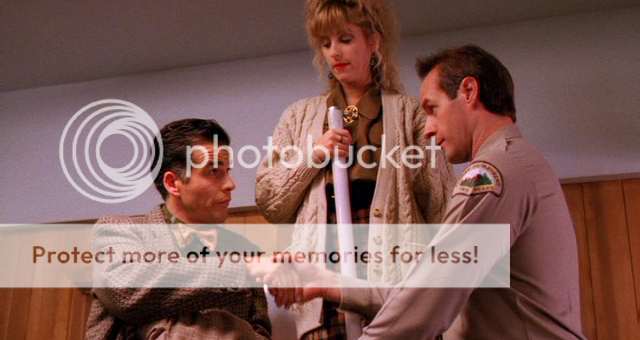


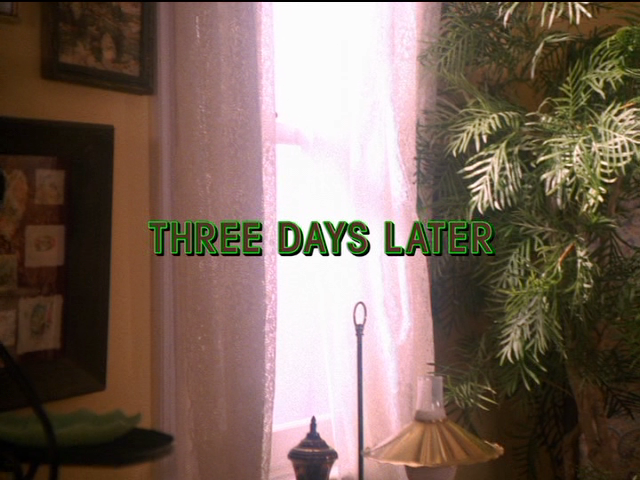









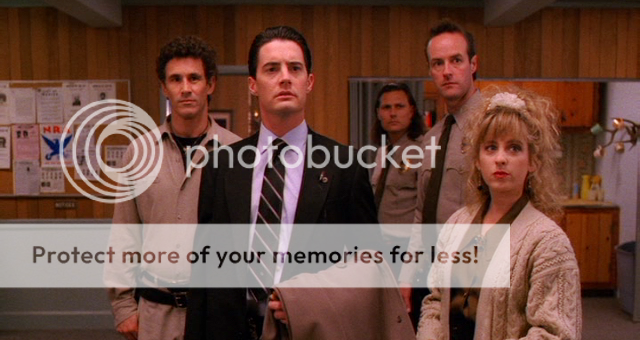



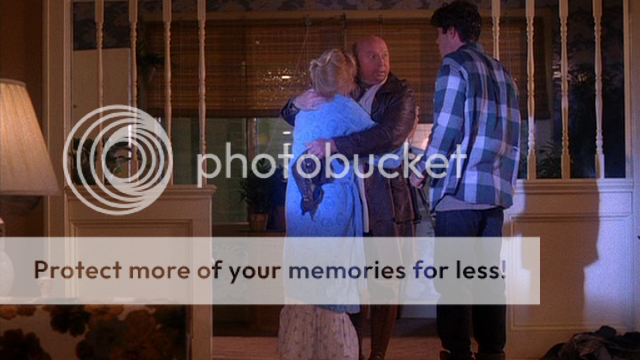
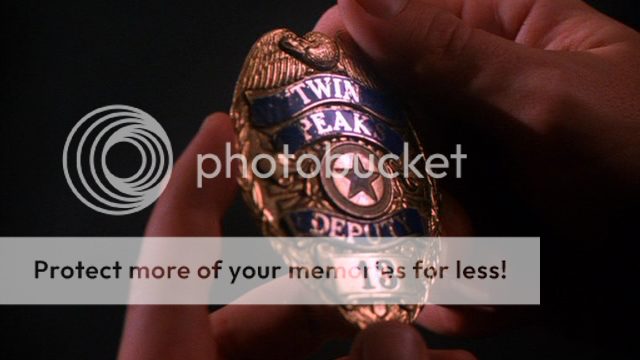





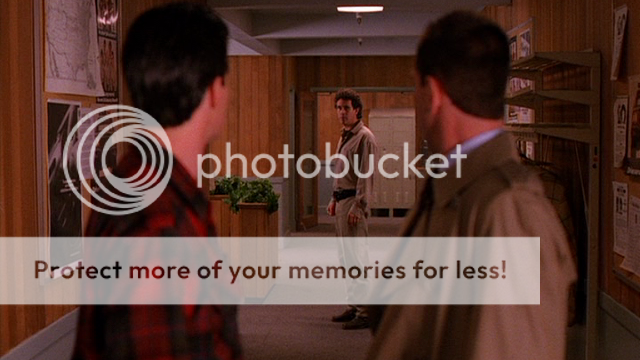




Great article - your captions in particular often had me laughing out loud.
ReplyDeleteWhen I first watched the series, like every newbie I was absolutely shocked by the turn it took after episode 16. I really expected them to explore the mysteries of the woods; it seemed like the revelation of Laura's killer had only opened up more mysteries.
I think what's so maddening about the show's dip is, as you note, how out-of-character it seems. Yes, Twin Peaks has always been a town (and a show) that mixed comedy, tragedy, melodrama, horror, and romance together but there's still just something so fundamentally WRONG about the way the characters act at that wake. Again, your captions just say it all so I won't add anything to that observation. Just that even had the comic subplots and random asides added up to more than they did, beginning the post-Laura stretch in this way is already a really tough mistake to rebound from.
When I wrote up the series for my blog, I skipped this stretch of episodes, and indeed jumped all the way from Leland's death to the final episode. I finally watched the second half of season 2 again early this year and it was more tolerable than I remembered. That said, it still feel just as pointless.
Sometimes it feels like Twin Peaks was born under a bad star. Everything that could go wrong did, from stuff out of the creators' control (the Gulf War, the Saturday night scheduling, ABC forcing them to resolve Laura Palmer), to stuff they should have had a better handle on (abandoning the series to work on other projects), to stuff they actually did right but got burned for anyway (making the show darker and less safely ironic, initially stretching out the reveal, exploring the real suffering involved in Laura's incest and Maddy's murder). They just could NOT catch a break.
While I do feel the last few episodes are a comeback (well, barring the finale which is a hell of a lot more than a comeback - it may be the best episode of the entire series), really the true heir to Twin Peaks ep. 1 - 16 (maybe even just ep. 1 - 14) is Fire Walk With Me. The revelation of Laura's killer/murder of Maddy is, in my opinion, the most powerful thing Lynch had ever shot up to that point, including his feature films. It represents a real turning point in his career in which evil is located closer to home and becomes much harder for his characters to escape.
To go from there to safe, wacky subplots simply isn't enough, and even the stuff in ep. 15 & 16 feels a little weak after the heights (or depths) we've explored under Lynch's hand. He really HAD to go back in time to unwrap Laura's corpse and discover what really went on there (despite what Frost and others thought about that decision).
Not sure how often you check the site (hopefully you'll be back with the final stretch of episodes soon) but I was compelled to comment. You really nailed what's so, so wrong about this stretch of episodes. It isn't just the weakness of the plotting or humor - it's the disrespect it demonstrates for the show's characters and tone. Frankly, I would have expected more of Peyton, Engels & the like. I wonder what wrong.
Thanks Joel. I appreciate your feedback and your remarks are spot on. To be fair, it's easy for us after the fact to dissect the show's problems as armchair quarterbacks, but I imagine it would have been difficult to find ourselves in Peyton's and Engels's position in the trenches at that time.
DeleteAfter all, arguably their best remaining subplot (Audrey/Cooper Romance) was taken off the table suddenly, which would have ruined a substantial amount of their outline for the remainder of the season. I imagine they had to scramble to recover and they ended up grasping at straws--very strange straws indeed.
And you're right that even excellent episodes like 15 & 16 paled in comparison to David Lynch's masterpiece in 14, but I'd argue that 15 & 16 at least feel like they were part of the same TV series that ran before. It's a little harder to say the same for the episodes that came after.
But yes, I fully support David Lynch taking the story back to Laura Palmer in the movie. From what I understand, Lynch was trying to develop a trilogy of films that would have started with the prequel, then gone on to explore more elements from the Twin Peaks TV series, one film following David Bowie's character and the other movie following Chris Isaak's. From what I heard, their storylines would have crisscrossed with the majority of the show's unresolved plots.
His prequel/sequel in Fire Walk with Me was remarkably powerful and really helped bring the story back to home, as you say. At least we can rest assured that the Japanese apparently agree with us. I heard the movie was a huge sensation there. But I'm still completely fascinated by imagining what David Lynch would have done with all those dangling threads from the series finale had the opportunity to make those next two films. Surreal journeys of this nature don't come by too often in a major production like this.
Me too. He could've even brought Sheryl Lee back as a red-haired "Judy" - an idea that occurred to me yesterday when I remembered that aside from Madeleine (whose name obviously inspired Maddy), Kim Novak's other character in Vertigo is named...Judy.
DeleteI'd love to read more about the production history of the show. I've seen the "Secrets From Another Place" documentary, and heard the various details Lynch, Frost, and others let slip out in interviews and recollections (and read the famed abandoned script for the finale), but feel there's so much more there to explore. I know that Martha Nochimson's book The Passion of David Lynch, which I've only perused thus far, goes behind-the-scenes to a certain extent. Any other resources you'd recommend?
I've actually been on a big Twin Peaks hunt for the past couple months, and the results - quotations from over 100 different sources, laid out chronologically on my blog, will be going up Monday. But my research was focused mostly on how critics, the public, and others reacted to the show & film over the years rather than how the sausage was made, so speak.
This comment has been removed by the author.
ReplyDeleteFirst off, this is a great recap of those dark, dark days of Twin Peaks. Actually the aimless kitsch and wackiness of Episodes 18-23 (or 24, as I might argue, though it is an improvement) is still superior to the shattering awfulness of Episode 17 and how it doesn't even remotely address the horrors of what has just occurred. At least the other slump episodes don't even try to, but 17 has that awkward, embarrassing wake scene you so aptly sum up with those captions. It's like an alien with no knowledge of either humanity or Twin Peaks had suddenly taken over the show.
ReplyDeleteSecondly, when are you going to post the next batch of episode recaps?? Not to be rude, but it's been a while! ;) Very interested on what you have to say on the decent-but-still-flawed Episodes 24-28, though I guess you already reviewed the masterpiece that is 29 (probably the best episode IMO).